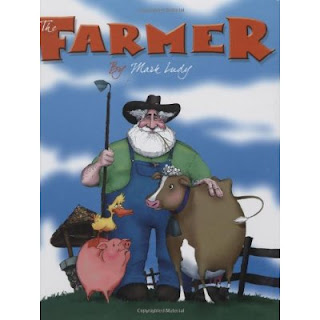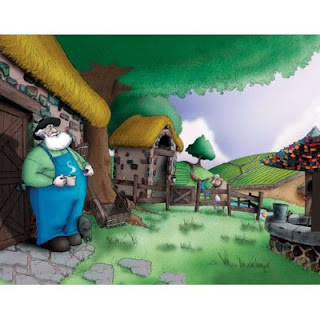 I always cringe when I hear parents talking in baby voices and using baby words when interacting with their not-so-babyish children. Or other people’s not-so-babyish children, especially once those kiddos are out of Baby Bjorns and are walking, jumping, feeding themselves, and hanging up their own coats at preschool.
I always cringe when I hear parents talking in baby voices and using baby words when interacting with their not-so-babyish children. Or other people’s not-so-babyish children, especially once those kiddos are out of Baby Bjorns and are walking, jumping, feeding themselves, and hanging up their own coats at preschool.
I usually bite my tongue, but what I want to yell is something along the lines of C’mon, Buddy. Are you serious? Vocabulary is a critical component of reading success! Get crazy–use bigger, better words–they can handle it! And they’ll love you for it later!!
Part of what I love about the rich literature available today is stumbling upon a well-written book that plays with words–one that goes beyond “nice, good, bad”.
One of our old-time favorites, The Farmer, by Mark Ludy is a great piece of literature on so many levels, but I’ve had vocabulary on my mind ever since reading an article on Word Consciousness early this week, so that’s what Maddy, Owen, and I talked about when Maddy chose this at bedtime tonight: vocabulary.
- Farm-Full of Rich Words: The Farmer is an incredible story about a genero
 us and hardworking farmer who loves his animals and his farm, and even when times are tough, the farmer remains steadfast in his devotion to God and in his kindness to others.
us and hardworking farmer who loves his animals and his farm, and even when times are tough, the farmer remains steadfast in his devotion to God and in his kindness to others.
Not only does the story provoke thoughtful discussion, the illustrations are gorgeous. The colors are vivid, and the characters–people and animals–are developed through careful detail and expressions.
The whole work comes together in a really amazing way that makes it hard not to fall in love with the farmer, his animal pals, and okay, even the Frump Family who turns around in the end.
So tonight, when Maddy chose the book, she said, I know you like this one, Mom. She was right.We read the story, like we usually do, and we searched on each page for Squeakers. But instead of sliding by some of the more challenging words, tonight I stopped–briefly–to chat about them.
After the farmer re-plants his crops, I read, ‘He is patient. He perseveres. And when soft rains fall, he kneels in thanks.’ I said, The farmer ‘perseveres’. He worked really hard after the fire; he re-plants his crops, and he doesn’t give up. He perseveres. What do you think ‘perseveres’ means?
Maddy said, Um, maybe that he’s a hard worker?
Owen added, That he is a hard worker, and he’s not crying.
I said, You’re right. The farmer is a hard worker, and he’s not crying or giving up. He’s determined to get his farm growing again. He’s working hard even though things are tough. When you persevere, you work hard even though things are not easy, and you don’t give up.
Maddy said, Kind of like he’s determined?
Yes. Woo-hoo! You got it.We also talked about “pleasant”, the “mature” garden, and “bounty”. We didn’t talk long; I tried not to break the flow of the story, but we talked long enough.
This was also not our first reading of the book–we’ve had it for years and years, so their familiarity with the text also allowed me more time to stop now and again.
Tomorrow, and for the next few days, I’m going to try to use these words in our every day conversations so that Maddy, Owen, and even Cora can add them to their working vocabulary. We’ll throw around a few high-fives and woo-hoo’s when they use them. And I’ll probably even do a little dance.
fyi: This kind of word consciousness, or being aware of new words, new ways of using words, and talking about those super-cool words we run across every day, is an integral component of language development and one of the predictors of success in reading comprehension.
When children are word conscious, they “are motivated to learn new words and able to use them skillfully” (Lane & Allen, The Vocabulary Rich Classroom: Modeling Sophisticated Word Use to Promote Word Consciousness and Vocabulary Growth, in February 2010’s The Reading Teacher.)
And really, why wouldn’t we want our kiddos to play with words and to develop their vocabulary? Vocabulary knowledge has long been identified as one of the best predictors of reading comprehension, reading performance in general, and school achievement (Lane & Allen citing Davis; Thorndike; Beck, McKeown, & Kucan in the article mentioned above).
another fyi: Not only do I have a secret crush on Mark Ludy (I seriously Googled him years ago because after falling in love with The Farmer; I was convinced he’d be a perfect match for one of my good pals, but he was already married), but now I also love him because his website rocks, he and his wife and three kids run a coffee house in Colorado, he blogs, and he spends time chattin’ with people about writing, art, following your dreams, and faith.
What’s not to love?
(And thanks to Amazon.com for the photos from the book!)



Leave a Reply